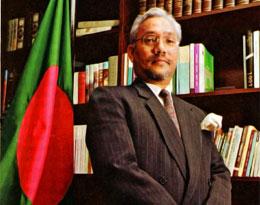Canada sheltering ‘assassin’ says Dhaka

Bangladesh has once again slammed Canada for sheltering the alleged killers of its founding president, Sheikh Mujibur Rahman. reviving a decades old disagreement between the two countries.
Targeting Canada, USA and Pakistan, Bangladesh Prime Minister Sheikh Hasina came down heavily on the nations for giving shelter to some killers of Sheikh Mujibur Rahman and his family members.
“This is unfortunate...these countries are giving shelter to the killers and we’ve to listen to lectures on human rights from them,” she said.
The prime minister was speaking at a rally after placing wreaths at the memorial of martyrs of the gruesome August 21 grenade attack at Bangabandhu Avenue in Dhaka.
Sheikh Mujibur Rahman and his family were brutally killed in Aug 1975 by some army officials, and out of the 12 convicted, five were hanged in 2010, one died and six are on the run. One death sentenced convict Lt Col (retd) M Rashed Chowdhury is now in the US, while another Noor Chowdhury lives in Toronto, Canada. They were all sentenced to death in April 2001 in trials that Amnesty International reportedly declared were fair and unbiased. Interpol has also issued a warrant of arrest against them. The Canadian government has opted not to deport Chowdhury. His refugee claims have been rejected and he is technically under a deportation order. But Ottawa does not extradite those facing execution overseas after Canada’s Supreme Court ruled in 2001 that it could not extradite fugitives without obtaining assurances they would not be executed.
“Some countries like Canada and America are giving shelters to some of the killers. Dalim and Rashid are now in Pakistan,” said Sheikh Hasina.
“They (US and Canada) lecture on human rights while sheltering killers of my parents, my little brother, pregnant Arju Moni. How unfortunate are we!” Hasina said in Dhaka.
A group of rouge army men killed Bangladesh’s independence architect and most of his family on Aug 15, 1975, barely four years after liberation.
Bangabandhu’s daughters Hasina and Sheikh Rehana were abroad at the time.
Twelve men were condemned to death for their role in the killing. Five of them have been executed but six others are abroad.
Rashed Chowdhury and Noor Chowdhury were granted asylum by the US and Canada respectively.
At an event, remembering the victims of the Aug 21, 2004 grenade attack, Prime Minister Hasina said the nation had been rid of stigma after the execution of Bangabandhu’s killers.
“Several countries like the US and Canada have sheltered some of the killers,” she said.
“(Shariful Haque) Dalim and (Khandaker Abdur) Rashid are in Pakistan.
“We’re trying to bring them back.”
Of the 12 convicts, Syed Faruk Rahman, Sultan Shahriar Rashid Khan, Mohiuddin Ahmed, Bazlul Huda and AKM Mohiuddin were hanged in 2010.
Another convict, Abdul Aziz Pasha, died in Zimbabwe.
Media reports suggest Moslemuddin is in the US while Abdul Mazed has been changing countries on a regular basis.
“Alas! The US is not sending back two of the killers. Rather, they have allowed them to stay there,” Hasina said. “Canada has done the same.”
Canada has already informed Bangladesh that it does not want to send back death-row convicts to their respective countries.
The prime minister recalled the killing of pregnant Arju Moni, wife of her cousin Sheikh Fazlul Haq Moni.
“She was shot dead in that state. How unfortunate this country is!” she lamented.
Bangladesh’s first military dictator and BNP founder Gen Ziaur Rahman came to power through a coup during the political chaos following Bangabandhu’s assassination.
He appointed the killers at Bangladesh’s foreign missions.
Zia also indemnified the killers.
Sheikh Hasina’s Awami League-led government scrapped the indemnity ordinance on Nov 12, 1996.
After Sheikh Hasina, became the Bangladesh prime minister, her administration started criminal proceedings against Noor Chowdhury and 10 others.
Chowdhury was then Bangladesh’s senior diplomat in Hong Kong and was asked to return to his country but he escaped from Hong Kong and entered Canada
During his trial in Bangladesh, the court heard Chowdhury was part of a cadre of junior officers who had conspired to assassinate Mujib and install a military-backed leader in his place.
Chowdhury, who had recently left the military, had joined the plot only two days before the assault on Rahman’s house in 1975.
He reportedly unleashed a burst of fire from his Sten gun which killed Rahman triggering an all-out massacre of the family.
Some 21 of Rahman’s relatives and employees w









